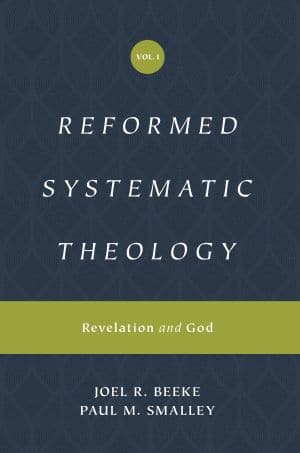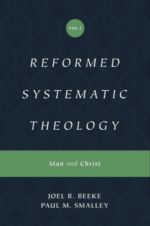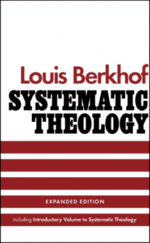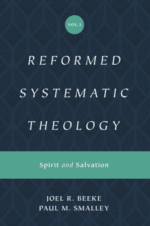Reformed Systematic Theology, Volume 1
Revelation and God
The church needs good theology that engages the head, heart, and hands.
This four-volume work will combine rigorous historical and theological scholarship with application and practicality—characterized by an accessible, Reformed, and experiential approach. This is Volume 1.
In this first volume, Joel R. Beeke and Paul M. Smalley explore the first two of eight central themes of theology: revelation and God.
Endorsement from Dr. Sinclair Ferguson
“Already the most prolific Reformed author of his generation, Joel Beeke (helped by his theological Barnabas, Paul Smalley) now harvests the fruit of a lifetime of study, reflection, teaching, and writing in this impressive magnum opus.
Throughout the centuries, theologians have debated whether systematic theology is an intellectual or practical discipline. Reformed Systematic Theology rightly treats it as both, for the Great Theologian of the church underlined that we cannot love the Lord our God with our mind unless we also love him with heart, soul, and strength. Thus, in these pages, doctrine leads to doxology and also to further enquiry.
Each locus is expounded biblically, is understood ‘together with all the saints,’ and leads to practical implications and applications, with psalms, hymns of praise, and probing questions for further reflection. This is catechesis at its best, in the great tradition of Augustine, Anselm, and Calvin, where ‘faith seeks understanding’ and leads to worship and obedience.
Here is a major contribution to the education of theological students, but also a work for preachers to have close by as a constant go-to resource, and indeed for every Christian family to own and frequently consult. While today it may seem that ‘of the making of systematic theologies there is no end,’ Reformed Systematic Theology makes a distinctive, deeply engaging, and welcome contribution and deserves a place of honor. Many will be grateful to Joel Beeke and Paul Smalley for giving this immensely valuable gift to the twenty-first-century church.”
— Sinclair B. Ferguson, Chancellor’s Professor of Systematic Theology, Reformed Theological Seminary; Teaching Fellow, Ligonier Ministries
About the Authors

Joel R. Beeke (PhD, Westminster Theological Seminary) has written over one hundred books. He is president and professor of systematic theology and homiletics at Puritan Reformed Theological Seminary, a pastor of the Heritage Reformed Congregation in Grand Rapids, Michigan, as well as the editor of Banner of Sovereign Grace Truth, the editorial director of Reformation Heritage Books, the president of Inheritance Publishers, and vice president of the Dutch Reformed Translation Society.

Paul M. Smalley (ThM, Puritan Reformed Theological Seminary) is faculty teaching assistant to Joel Beeke at Puritan Reformed Theological Seminary. He previously served for twelve years as a pastor in the Baptist General Conference in the midwestern United States.
Further Endorsement
“This account of the doctrines of revelation and of God, built on biblical exegesis, is rich in theological discussion and practical implications. It is very accessible and will be of interest to a wide readership. Beeke and Smalley are to be congratulated, and I look forward to further volumes in the future.”
Robert Letham, Professor of Systematic and Historical Theology, Union School of Theology
Table of Contents
Abbreviations
Tables
Preface
Part 1: Prolegomena: Introduction to Theology and the Doctrine of Revelation
Analytical Outline: Prolegomena
Section A: Introduction to Theology
- What Is Theology? Part 1: An Academic Discipline
- What Is Theology? Part 2: A Spiritual Discipline
- Who Does Theology? Where? When?
- Which Theology Do We Do? Part 1: Christian, Catholic, Evangelical
- Which Theology Do We Do? Part 2: Reformed: Historical, Confessional, Theological, and Hermeneutical Perspectives
- Which Theology Do We Do? Part 3: Reformed: Polemical and Experiential Perspectives
- Why Do We Do Theology?
- How Do We Do Theology? Part 1: Spiritual Dynamics
- How Do We Do Theology? Part 2: Academic Methods
Section B: The Doctrine of Revelation
- Theological Fundamentals of Divine Revelation
- General Revelation, Part 1: Biblical Teaching
- General Revelation, Part 2: Philosophy and Science
- General Revelation, Part 3: Natural Theology and Theistic Arguments
Excursus: Some Historical Perspective on Natural Theology and Theistic Proofs
- Special Revelation: Biblical Teaching
- Errors Regarding Special Revelation, Part 1: Romanism and Liberalism
- Errors Regarding Special Revelation, Part 2: Liberalism’s Offspring
- The Bible as the Word of God
- The Properties of the Written Word, Part 1: Authority and Clarity
- The Properties of the Written Word, Part 2: Necessity, Unity, and Efficacy
- The Properties of the Written Word, Part 3: Inerrant Veracity
- The Properties of the Written Word, Part 4: Objections to Inerrancy
- The Properties of the Written Word, Part 5: Sufficiency
- The Cessation of Special Revelation, Part 1: Charismatic Continuationism
- The Cessation of Special Revelation, Part 2: Prophecy Today
- Applied Revelation for Practical Fruit
Part 2: Theology Proper: The Doctrine of God
Analytical Outline: Theology Proper
Section A: The Doctrine of God’s Triune Glory
- Introduction: The True Knowledge of God
- Introduction to God’s Nature and Attributes, Part 1: Biblical Teaching
- Introduction to God’s Nature and Attributes, Part 2: Theological Issues
- The Name of “the Lord” (YHWH)
- The Holiness of the Lord
- Gods That Are Not God
- God’s Spirituality
- God’s Simplicity: “The Lord Our God Is One Lord”
- God’s Infinity, Part 1: Incomprehensibility, Aseity, and Immensity
- God’s Infinity, Part 2: Eternity: Infinity with Respect to Time
Excursus: Problems of Time and Eternity
- God’s Immutability, Part 1: Biblical Teaching
- God’s Immutability, Part 2: Theological Questions
- God’s Knowledge, Part 1: Omniscience and Wisdom
- God’s Knowledge, Part 2: Foreknowledge
- God’s Sovereignty: An Introduction to Omnipotence
- God’s Moral Excellence, Part 1: Goodness and Love
- God’s Moral Excellence, Part 2: Truth and Righteousness
- God’s Moral Excellence, Part 3: Jealousy, Impassibility, and Joy
- God’s Moral Excellence, Part 4: Wrath and Compassion
- The Trinity, Part 1: Biblical Teaching
- The Trinity, Part 2: Historical Development
- The Trinity, Part 3: Theological and Practical Considerations
Section B: The Doctrine of God’s Sovereign Purpose
- The Decree of God: General Considerations
- Predestination, Part 1: Election and Reprobation
- Predestination, Part 2: Historical Development through Reformed Orthodoxy
- Predestination, Part 3: Questions and Uses
- God’s Providence, Part 1: Biblical Teaching
- God’s Providence, Part 2: Problems and Applications
Section C: The Doctrine of Angels and Demons
- The Holy Angels of God
- Satan and the Demons
Bibliography
General Index
Scripture Index












